Key takeaways:
- Historical fiction movies blend factual events with imaginative storytelling, evoking empathy and a deeper understanding of past struggles.
- Streaming services enhance accessibility and diversity in historical narratives, allowing viewers to explore both mainstream and indie films.
- Popular platforms like Netflix, Hulu, and Amazon Prime Video offer a wide range of historical content, prompting discussions and deeper engagement with history.
- Films like “12 Years a Slave,” “Lincoln,” and “The King’s Speech” highlight personal struggles against the backdrop of significant historical events, making history relatable and impactful.
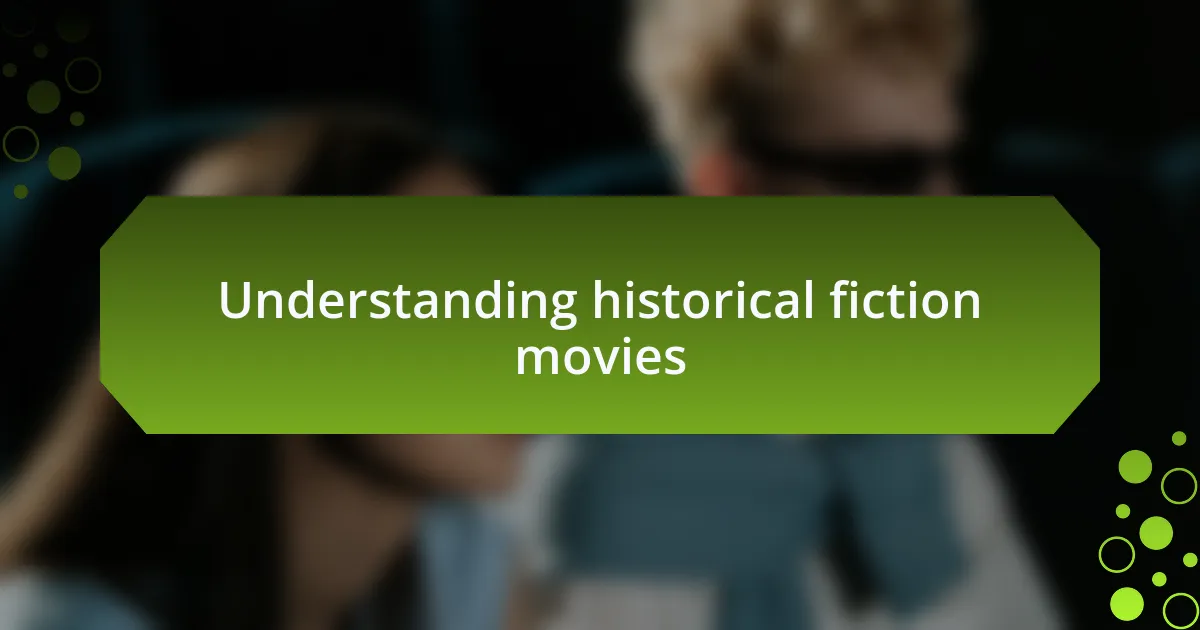
Understanding historical fiction movies
Historical fiction movies transport viewers to different eras, blending factual events with imaginative storytelling. I remember watching “The King’s Speech” for the first time; it resonated emotionally, offering a glimpse into the struggles of King George VI. How often do we marvel at how history, when narrated through a personal lens, can evoke such deep empathy?
These films don’t just retell events; they breathe life into the characters who lived through them. For instance, “12 Years a Slave” vividly illustrated the harrowing experiences of Solomon Northup, making the historical context unforgettable. Don’t you think that when a story connects on a personal level, it becomes more than mere entertainment? It turns into a powerful reminder of our past.
Moreover, the blend of historical accuracy and creative license in these movies invites viewers to reflect on the complexities of human experiences. I once questioned how filmmakers balance fact with fiction while still honoring the truth. It made me appreciate the craftsmanship behind films like “Dunkirk,” where the urgency of the moment is palpable, pushing us to confront the harsh realities that shaped our world. How do you feel when a film strikes that perfect balance?
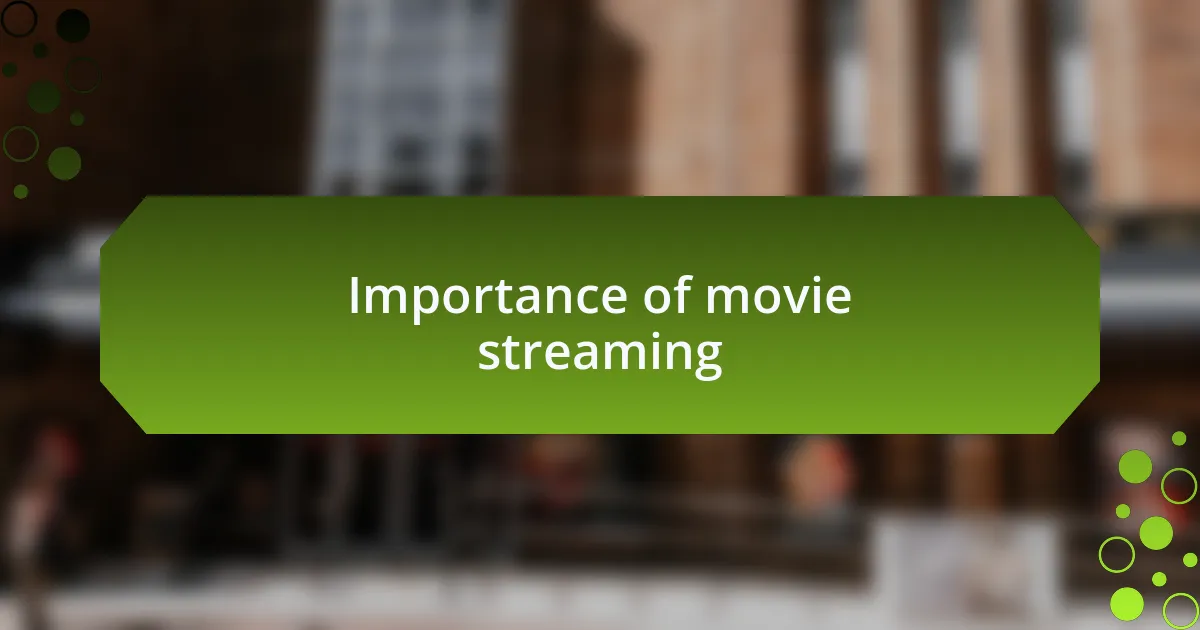
Importance of movie streaming
Streaming services have revolutionized how we access films, including historical fiction, giving us the freedom to watch what we want, when we want. I remember scrolling through my streaming app, stumbling upon “The Imitation Game” one late night. It felt like discovering a hidden gem that not only entertained but educated me about Alan Turing’s contributions during World War II. Isn’t it remarkable how streaming opens the door to stories that might otherwise have been overlooked?
The importance of movie streaming extends beyond convenience; it also broadens diversity in storytelling. I’ve found that platforms often showcase indie films alongside blockbusters, giving a voice to lesser-known historical narratives. For example, I was able to watch “The Other Boleyn Girl,” which, while a bit dramatic, offered a fresh perspective on the lives of women in Tudor England. How often do we overlook these nuanced stories in the mainstream?
Moreover, the interactive viewing options that streaming provides encourage discussions among viewers. I love discussing plots or character arcs right after watching with friends online, deepening our understanding of history through mutual insights. It’s fascinating to compare different interpretations of the same events, don’t you think? These conversations enrich my experience, making every film a significant piece of a larger puzzle in understanding our collective past.
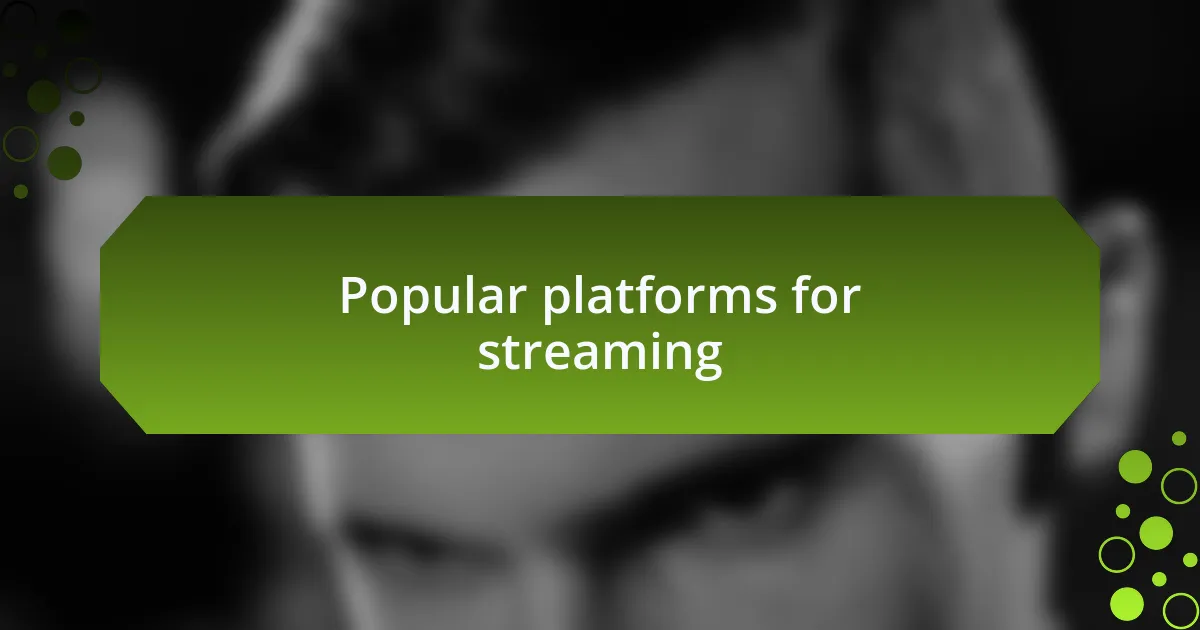
Popular platforms for streaming
When it comes to popular streaming platforms, Netflix often tops the list due to its extensive library of historical fiction. I remember binge-watching “The Crown” and getting swept away by the intricate portrayal of British royalty. Each episode transported me to a different era, sparking my curiosity about real history behind the drama. Have you ever felt that thrill of learning while being entertained?
Hulu is another platform that caught my attention for its unique offerings. I discovered “The Act” there, which left me with a mix of disbelief and compassion for the characters. The way Hulu curates its content around powerful true stories often leads me to engage in deeper conversations about the events portrayed. Doesn’t it feel rewarding when a film prompts us to analyze and discuss uncomfortable truths?
Then there’s Amazon Prime Video, which sometimes surprises me with its collection of lesser-known historical films. I vividly recall watching “The Aeronauts,” a delightful blend of adventure and history that made me appreciate the pioneers of flight. Platforms like Prime remind me that the world of historical fiction is vast, and there’s always something new to explore. What’s on your watchlist that’s teaching you something unexpected about our past?
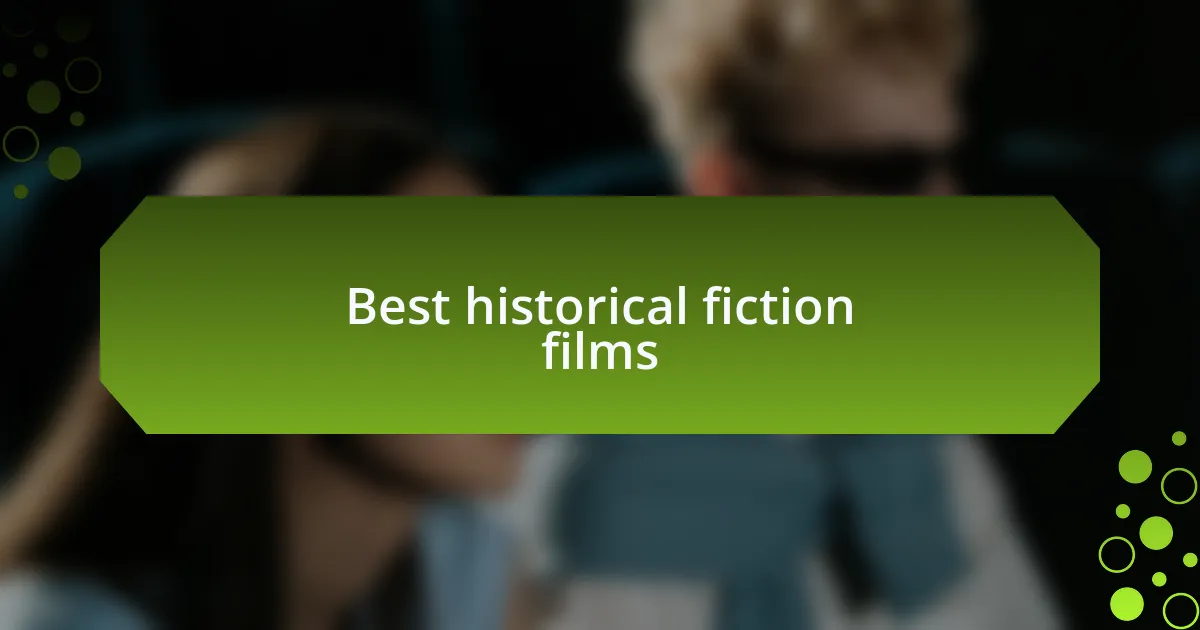
Best historical fiction films
The film “12 Years a Slave” truly stands out in the realm of historical fiction. When I first watched it, I was profoundly moved by the raw depiction of slavery in America. It’s not just a story; it’s a painful reminder of our history, compelling viewers to confront truths that are often glossed over. How often do we find ourselves grappling with the heavy weight of history while being captivated by a film?
Another gem in the historical fiction genre is “Lincoln,” directed by Steven Spielberg. I remember being struck by Daniel Day-Lewis’s portrayal of Abraham Lincoln. The film takes us behind the scenes of monumental decision-making during the Civil War. It made me reflect on leadership’s moral complexities and the sacrifices made for the greater good. Isn’t it fascinating how films can spark such deep introspection about our past?
On a lighter note, “” cleverly intertwines humor and history through its portrayal of the unlikely alliance between activists and striking miners in 1980s Wales. After watching it, I found myself smiling and feeling uplifted while also appreciating the film’s crucial historical context. Isn’t it amazing how historical narratives can also bring about joy and unity in the face of adversity?
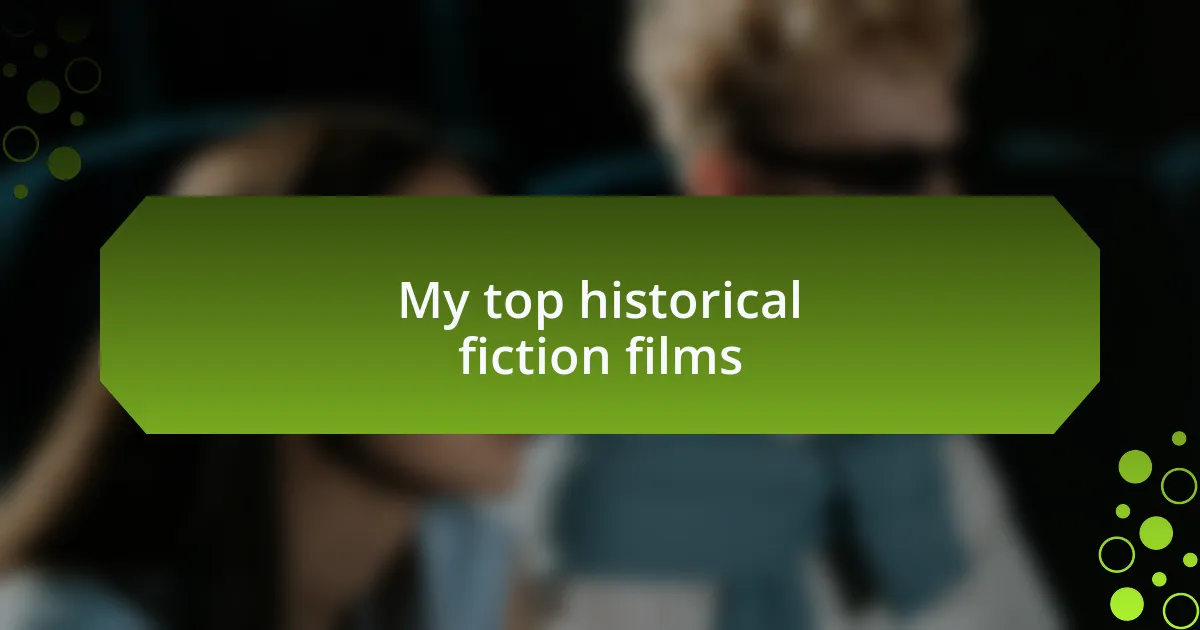
My top historical fiction films
One of my all-time favorites in historical fiction is “The King’s Speech.” Watching Colin Firth masterfully depict King George VI’s struggle with his speech impediment struck a chord with me. It beautifully illustrates how personal challenges intersect with historical moments, making me ponder how vulnerability shapes leadership. Have you ever felt inspired by someone overcoming their fears in a time of crisis?
Another remarkable film is “Atonement,” which left me in tears the first time I saw it. The way it explores love and war through the lens of a fabricated accusation adds layers to our understanding of human relationships. The backdrop of World War II heightened every emotional moment for me; it was a poignant reminder of how history impacts personal lives, sometimes in heartbreaking ways. Don’t you think that such narratives make the emotional weight of historical events even more relatable?
Lastly, “Gladiator” is a film I can watch repeatedly, not just for the epic battles but for the way it captures the essence of honor and vengeance in ancient Rome. I remember the exhilaration I felt during the chariot scene; it’s exhilarating to see history come alive. It raises important questions about leadership and legacy—what does it mean to fight for what you believe in? This film has what we need today: the courage to stand against tyranny and the desire for justice can be as compelling now as it was then.

How to find new films
When I’m on the hunt for new films, I often turn to curated lists from reputable film critics or streaming services. There’s something satisfying about discovering hidden gems that may not be featured in mainstream advertising. I remember stumbling upon a fantastic historical drama while scrolling through a niche streaming platform, and it turned into one of my favorites. Isn’t it serendipitous how a little exploration can lead to unexpected treasures?
Social media platforms, especially film-related groups on sites like Facebook or Reddit, can also be gold mines for discovering new films. I’ve joined several communities that are passionate about historical fiction, and the recommendations they share have vastly expanded my viewing horizons. Have you ever turned to a community for recommendations? I did, and suddenly my watchlist grew to a length that almost felt daunting, yet exciting!
Another strategy I find effective is watching trailers or joining virtual film festivals. Trailers can give you a quick taste of the storytelling style and cinematography, helping you decide if it resonates with you. I often find myself intrigued by the artistry in the previews, which leads to delightful film nights. When was the last time a trailer left you eager for more? It’s amazing how a few captivating moments can ignite your interest in a film’s deeper historical narrative.